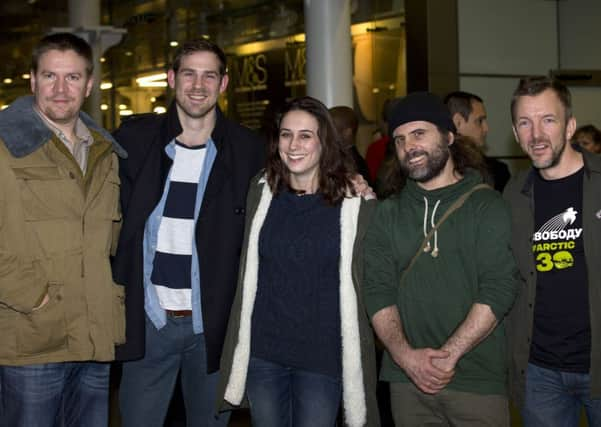Freed members of Greenpeace Arctic 30 return to UK


The five were arrested amid claims of “hooliganism” following a protest about oil drilling, and held in jail for two months. They have since been granted amnesty under a new Russian law.
Greenpeace member Anthony Perrett, 32, of Newport, South Wales, arrived in London with fellow activists Alexandra Harris and Phil Ball, crew member Iain Rogers and freelance videographer Kieron Bryan.
Advertisement
Hide AdAdvertisement
Hide AdA sixth Briton, activist Frank Hewetson, has also been released and is travelling to another country.
The Arctic 30 – 28 activists and two freelance journalists – were arrested after Russian authorities boarded their ship, the Arctic Sunrise, during an anti-drilling demonstration in September.
The group were detained for protesting against an Arctic offshore oil rig owned by the Russian company Gazprom.
They were initially charged with piracy, but the charge was later changed to hooliganism.
They had their passports returned to them after being freed on bail by courts in St Petersburg, but initially did not have visas to leave Russia.
Arriving at St Pancras, a tired-looking Mr Perrett told reporters: “It has been a strange few months, but it is over now and it is good to be back. We’re very relieved to be home, it’s good to be back and speaking English, which has been sorely missed.”
Asked whether it had been worth it, he said: “Well, look at the media that’s here today. We’re trying to spread the word to save the Arctic and I think we have done that job fairly well.”
He added: “I’m looking forward to spending some time in the woods and getting at one with nature that we are trying to preserve.”
Advertisement
Hide AdAdvertisement
Hide AdMs Harris said she thought the Russian government let the Arctic 30 go to avoid global criticism in the lead up to the 2014 Sochi Winter Olympics. “I think it was the easy way out for Russia, to get rid of us before the Olympics began and before there’s a big PR pressure from Greenpeace and the rest of the world,” she said, adding that the fact they were given an amnesty, despite doing nothing wrong, was “not ideal”.
“But I’m not in a position to refuse it, I can’t have seven years hanging over me,” she said of the jail penalty she was probably facing.
However, the activist said she would not rule out a similar protest again, despite slamming the appalling conditions she faced in custody. “The conditions are really bad, it’s cold, the food is inedible – it’s not good,” she said.
She said the Arctic 30 had been treated better than Russian prisoners “because the world’s watching us and they’re scared of what we’re going to say now”.
Mr Ball, 42, from Chipping Norton, Oxfordshire, described the prison conditions as “shocking”. He said: “The electric lights were on 24 hours a day, it was so cold that I was fully clothed and still shivering all through the night It was disgustingly dirty. There was a family of rats living in one of the cells.”
The father-of-three said he echoed the words of Russian punk band Pussy Riot, who branded their recent release by Russian authorities as a “PR stunt”.
Mr Bryan said: “The day before amnesty I was still being told that we might be facing two years in prison so it’s a heck of a change in nine days, 100 days since we were detained by the Russian authorities illegally.”